MEETUP 2018
Decoding Peterson’s
12 Rules for Life
This is the second of four Meetups on “Decoding Jordan Peterson’s 12 Rules of Life,” hosted by Dr. Paul Wong for the INPM’s Meaningful Living Project. For an overview of this Meetup series, see below.
In a polarized world full of “fake news” and “alternative facts,” it becomes increasingly difficult to define or discern what is truth. The same event can be perceived differently, and the same term can be interpreted differently. To make things worse, there is a vast conspiracy to convince us that lying is good for us. This pernicious dark net includes the Devil, father of all lies; the post-modern teaching that all truth is relative; the ubiquitous advertising machinery; government-sponsored brain-washing apparatus; our unconscious fear of shame, rejection, and danger; our conscious intention to look and act better than we are; and the misguided ambition to be rich and famous so that we can be happy.
Even in scientific research, the quest for truth can be compromised in many ways. First of all, truth means more than “factfulness” (Rosling, 2018), because we can always cherry pick statistics to support our position. Secondly, our worldview or point of view not only shapes our perceptions, but also affects how science is done (Medin, Lee, & Bang, 2014). Therefore, we need to examine the lens through which we view the world. Finally, scientists’ own desires for survival and academic success may contaminate their findings (Hesselmann, Graf, Schmidt, & Reinhart, 2017; Watson, 2018).
In a time of universal deceit, what can we believe, who can we trust? How can we discern the difference between truth and falsehood? In this chapter, Peterson argues that truth telling is important for our survival and wellbeing; he is also optimistic that we can escape from the powerful and vast dark net of deception with critical self-reflection, a firm grounding in the truth, faith in a better future, and the courage to speak the truth, no matter what it costs.
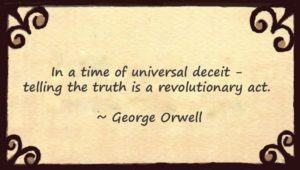 Truth telling may sound like an old-fashioned virtue of honesty, but Jordan Peterson takes this simple idea to unexpected levels of depth and complexity, and challenges us to take a good hard look at ourselves and the world we live in. He is asking us some tough questions: “Do you really know what truth means? Can you handle the truth? Do you know how painful it is to face the truth? Do you know that your life can never be the same again once you have confronted and embraced the truth?”
Truth telling may sound like an old-fashioned virtue of honesty, but Jordan Peterson takes this simple idea to unexpected levels of depth and complexity, and challenges us to take a good hard look at ourselves and the world we live in. He is asking us some tough questions: “Do you really know what truth means? Can you handle the truth? Do you know how painful it is to face the truth? Do you know that your life can never be the same again once you have confronted and embraced the truth?”
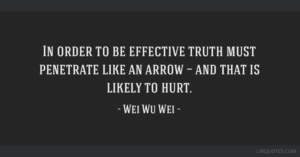 As a simple exercise, I would ask you, “Are you a liar?” What would be your instinctive response? If I were to look into your eyes, and ask, “Are you sure that you don’t lie?” You may sheepishly reply, “Well, occasionally I may tell white lies.” Almost all people deny that they are liars. But the reality may be different. According to a widely circulated quote on the internet, the average person tells four lies a day, and 1,460 lies a year. Some of the common lies are “I’m fine,” “You are fine,” “I’m sorry,” “I didn’t do it,” “I don’t have the time,” or “I don’t remember.”
As a simple exercise, I would ask you, “Are you a liar?” What would be your instinctive response? If I were to look into your eyes, and ask, “Are you sure that you don’t lie?” You may sheepishly reply, “Well, occasionally I may tell white lies.” Almost all people deny that they are liars. But the reality may be different. According to a widely circulated quote on the internet, the average person tells four lies a day, and 1,460 lies a year. Some of the common lies are “I’m fine,” “You are fine,” “I’m sorry,” “I didn’t do it,” “I don’t have the time,” or “I don’t remember.”
In fact, I would argue that, on an average, we actually lie a lot more than four times a day. For example, we lie, wherever (a) we say that we are better than we really are (Taylor & Brown, 1994); (b) we make excuses for our mistakes or procrastination (Carmichael & Krueger, 2015); (c) we show self-serving biases in our attributions, such as taking credit for success and denying responsibility or failure (Miller & Ross, 1975; Ross, 1977); (d) we flatter or suck up to someone (Psychologist World, n.d.); (e) we suppress our own feelings in order to conform to the group pressure or to please others (Beran, 2015; Sirota, 2018); (f) practice hypocrisy (Pychyl, 2012; Matthews & Mazzocco, 2017); or (g) practice self-deception (Burdon, 2012; Goleman, 1985).
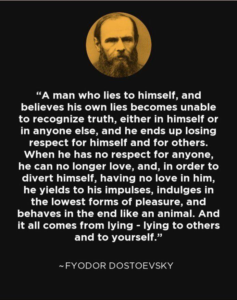 I can go on and on to cite psychological research that demonstrates the ubiquitous phenomenon of self-deception and lying, regardless of whether we do it unconsciously or consciously. The tragedy is that after lying habitually, one’s entire life becomes a living lie and one becomes a pathological liar while still believing that one is telling the truth (Đurić-Jočić., Pavlicić, & Gazivoda, 2016).
I can go on and on to cite psychological research that demonstrates the ubiquitous phenomenon of self-deception and lying, regardless of whether we do it unconsciously or consciously. The tragedy is that after lying habitually, one’s entire life becomes a living lie and one becomes a pathological liar while still believing that one is telling the truth (Đurić-Jočić., Pavlicić, & Gazivoda, 2016).
Yes, Peterson insinuates that all people are liars. One may tell lies to avoid embarrassment, protect one’s ego, or gain some advantage, consciously or unconsciously. The problem of lying is compounded by the fact that most people are not aware of the pernicious costs of lying to themselves and to others. Tragically, the path from lying to oneself to living a lie is often imperceptible if one does not engage in serious self-reflection.
Truth or Lies: The Most Consequential Choice
By way of example, Peterson (2018) openly admits he was once “a fake” a few years before embarking on clinical training:
I was using language to bend and twist the world into delivering what I thought was necessary. But I was a fake. Realizing this, I started to practise only saying things that the internal voice would not object to. I started to practice telling the truth—or, at least, not lying. I soon learned that such a skill came in very handy when I didn’t know what to do. (p. 205)
That was a defining moment in Peterson’s life. After some serious soul searching, he came to the realization that “almost everything I said was untrue. I had motives for saying these things: I wanted to win arguments and gain status and impress people and get what I wanted” (Peterson, 2018, p. 205).
This awakening was akin to conversion and redirected him to a different direction of truth telling, no matter how hard and risky. He has unflinchingly practiced truth telling, and the consequences are far beyond his expectations. Peterson takes truth seriously. His entire academic career is built on the axiom that truth telling is essential for building good character and relationships.
He refuses to use transpersonal pronouns because he does not consider them as part of the English language and believes that no one should be compelled to use words that have no meaning to them. Judge for yourself whether you know how to pronounce or use the pronouns shown in the following table (also see Lesbian, Gay, Bisexual, Transgender Resource Center, 2018). He objects to Canada’s Bill C-16, because it compels people to say things against their conviction.
Paradoxically, Peterson has become both a victor and a victim of his enormous success as a result of his battle against compelled speech. He has become a rock star in psychology because of his courageous fight against political correctness, but he has also become the most hated professor according to the political left. Slayback (2018) has provided a partial explanation why he has been hated by so many intellectuals.
To Peterson, telling the truth is the best way to orient ourselves in world of chaos and uncertainties. Truth provides us with secure grounding and a moral compass to transform chaos into order, and hell to heaven. Truth is like a surgeon’s scalpel—it hurts when it cuts away what is rotten or dead in us, but in so doing, it also heals us and saves our lives. Most importantly, when we speak the truth, we serve good rather than evil, life rather than death. Deception destroys us, while truth builds us up. If we are afraid of offending people, we have to stop speaking the truth and start telling lies, contributing more to the moral malaise of our society. We are confronted with this fundamental choice all the time.
The take-home lesson from Chapter 8 is that when you are in a complicated and difficult situation with many options, but you do not have enough information to decide on the best course of action, honesty is still the best policy. In these ambiguous and complex situations where the stakes are high, you need to consult your heart of hearts, your core values and beliefs, and your conscience to make sure that you will tell the truth in love according your best judgement and without any intention to harm anyone, regardless of personal cost. The alternative is to say something not true but expedient. The challenge is to choose what is true and meaningful rather than what is untrue but beneficial to you.
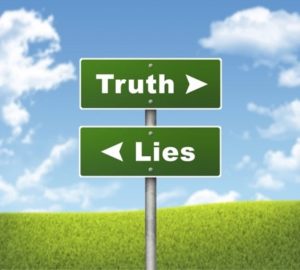 “Taking the easy way out or telling the truth—these are not merely two different choices. They are different pathways through life. They are utterly different ways of existing” (Peterson, 2018, p. 209). By starting to practise telling the truth or at least not lying, your life can also be transformed in a fundamental way; but there can also be unexpected negative consequences in an increasingly polarized world. In difficult times, what will ultimately save your life and reputation is telling the truth no matter what.
“Taking the easy way out or telling the truth—these are not merely two different choices. They are different pathways through life. They are utterly different ways of existing” (Peterson, 2018, p. 209). By starting to practise telling the truth or at least not lying, your life can also be transformed in a fundamental way; but there can also be unexpected negative consequences in an increasingly polarized world. In difficult times, what will ultimately save your life and reputation is telling the truth no matter what.
Questions About Truth Telling
This chapter raises a number of difficult questions about truth telling, such as: What is truth? Are there different kinds of truth, such as scientific truth, transcendental truth, and metaphorical truth? Why does truth telling both wound and heal us? Why do people hate those who speak the truth? In what way does truth set us free?
At a practical level, is it possible for us to survive in this society by being fiercely honest? How can we know what is true in a world of fake news, fake products, and fake people? What motivates people to tell lies? What shall it profit a man if he gains the whole world but forfeits his soul (Mark 8:36) by cheating his way to success?
At a deeper level, is it possible that our confidence in rationality may be paradoxically a source of untruth? In what ways can rationality hinder us from knowing the truth? What does Peterson (2018) mean in this statement:
The capacity of the rational mind to deceive, manipulate, scheme, trick, falsify, minimize, mislead, betray, prevaricate, deny, omit, rationalize, bias, exaggerate and obscure is so endless, so remarkable… It is because rationality is subject to the single worst temptation—to raise what it knows now to the status of an absolute. (p. 217)
 At the spiritual level, what are the terrible consequences in telling untruth? Why does the Bible refer to the Devil as the father of all lies? How was the fall of humanity related to lying and blaming the other, according to Genesis, chapter 3? In what way have lies created hell in your life and in our world? Is it possible that most of the evils and sufferings be attributed to fake people, fake products, nihilistic thinking, the need to cover up shame, and the epidemic of telling lies?
At the spiritual level, what are the terrible consequences in telling untruth? Why does the Bible refer to the Devil as the father of all lies? How was the fall of humanity related to lying and blaming the other, according to Genesis, chapter 3? In what way have lies created hell in your life and in our world? Is it possible that most of the evils and sufferings be attributed to fake people, fake products, nihilistic thinking, the need to cover up shame, and the epidemic of telling lies?
Is Peterson (2018) exaggerating in this paragraph about the evil of deception?
It is deceit that makes people miserable beyond what they can bear. It is deceit that fills human souls with resentment and vengefulness. It is deceit that produces the terrible suffering of mankind: the death camps of the Nazis; the torture chambers and genocides of Stalin and that even greater monster, Mao. It was deceit that killed hundred of millions of people in the twentieth century. It was deceit that almost doomed civilization itself. It is deceit that still threatens us, most profoundly, today. (p. 221)
 Why are the above tragedies the most difficult for people to endure? Why is totalitarian ideology dangerous? How can we best protect ourselves against all the fake news and ideological deceptions? In what way can character save us from deception? What does Peterson (2018) mean in this paragraph? “With love, encouragement and character intact, a human being can be resilient beyond imagining. What cannot be borne, however, is the absolute ruin produced by tragedy and deception” (p. 217)
Why are the above tragedies the most difficult for people to endure? Why is totalitarian ideology dangerous? How can we best protect ourselves against all the fake news and ideological deceptions? In what way can character save us from deception? What does Peterson (2018) mean in this paragraph? “With love, encouragement and character intact, a human being can be resilient beyond imagining. What cannot be borne, however, is the absolute ruin produced by tragedy and deception” (p. 217)
According to the Bible, all lying is wrong and sinful. For example, take the commands, “You shall not bear false witness against your neighbour” (Ex. 20:16), “Therefore, putting away lying, ‘Let each one of you speak truth with his neighbour,’ for we are members of one another” (Eph. 4:25), and “Do not lie to one another” (Col. 3:9). So why does the Bible emphasize truth telling and warn against lying? In what way does lying create hell for us? In what way does truth telling reduce suffering and transform reality? What does Peterson mean in this paragraph?
To tell the truth is to bring the most habitable reality into Being. Truth builds edifices that can stand a thousand years. Truth feeds and clothes the poor, and makes nations wealthy and safe. Truth reduces the terrible complexity of a man to the simplicity of his word, so that he can become a partner, rather than an enemy. (Peterson, 2018, p. 230)
In what ways can we make life better for ourselves and others by using our words as a powerful tool to move people towards truthfulness, kindness, and personal maturity? Do we need the courage to be vulnerable and self-sacrificial in order to tell the truth? Is it possible that we can create a little “paradise” on earth by religiously cultivating the virtue of truth telling? What does it mean that, “In Paradise, everyone speaks the truth. That is what makes it Paradise.” (Peterson, 2018, p. 230)?
Deeper Issues in Truth Telling
Truth telling is an ancient virtue, but Peterson is able to shed some new light on some deeper issues related to truth telling. He provides a broader framework to highlight both the pernicious dangers of telling lies and the essential importance of truth telling for bettering our present existence and future.
Words Are More Dangerous than Swords
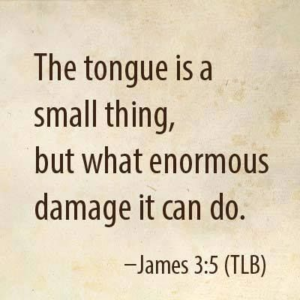 Words are dangerous when one does not carefully think about the consequences. When one is careless, a false statement or an intentional innuendo can start a fire that gets out of control, causing untold damages to relationships and the peace of a community. So many unnecessary conflicts are started by careless words. However, a greater danger is when words are used or twisted intentionally to control and exploit people.
Words are dangerous when one does not carefully think about the consequences. When one is careless, a false statement or an intentional innuendo can start a fire that gets out of control, causing untold damages to relationships and the peace of a community. So many unnecessary conflicts are started by careless words. However, a greater danger is when words are used or twisted intentionally to control and exploit people.
According to Wittgenstein’s influential theory of language (see Phillips, 2015), words are not just some representations of objects; they are effective tools for different functions. Do not use speech as a tool to manipulate others and get what you want
Someone living a life-lie is attempting to manipulate reality with perception, thought and action, so that only some narrowly desired and pre-defined outcome is allowed to exist. A life lived in this manner is based, consciously or unconsciously, on two premises. The first is that current knowledge is sufficient to define what is good, unquestioningly, far into the future. The second is that reality would be unbearable if left to its own devices. (Peterson, 2018, 210)
The first premise is based on the illusion that they already know the root cause of all our problems and how to resolve it through rationality. “The faculty of rationality inclines dangerously to pride: all I know is all that needs to be known. Pride falls in love with its own creations, and tries to make them absolute” (Peterson, 2018, p. 210).
The second premise is equally false. They think that they can impose their ideology on people and achieve utopia without taking to consideration the reality of our biological and psychological nature. The fact is: the universe is complicated, people are complicated, and life is complicated.
Only the most cynical, hopeless philosophy insists that reality could be improved through falsification. … It denounces truth as insufficient and the honest man as deluded. It is a philosophy that both brings about and then justifies the endemic corruption of the world. (Peterson, 2018, p. 212)
Therefore, we need to be vigilant about any totalitarian ideology. We need to be courageous, open-minded, and inquisitive and do the hard work of looking at the complicated reality and accept the limitation of our rationality and methodology. It is the virtue of our humility and courage to allow us to discover the simple truth of living.
To reduce complex problems into a single axiom is a lie. “They believe, narcissistically, underneath all that bad theory, that the world could be put right, if only they held the controls” (Peterson, 2018, p. 211). Ideologues and demagogues are prone to do that. The danger of demagogues is that they are able to make clever use of words and manipulate language in order to tap into people’s deepest fears and yearnings for political gains. When one becomes radicalized by ideology or brain-washed, one is no longer able to use reasoning and critical reflection to differentiate between truth and falsehood.
In short, the more dogmatic an ideology, the more difficult for it to tolerate any truth that contradicts the official dogma. That is why truth is always the first casualty in any totalitarian state; anyone daring to speak the truth will risk imprisonment or death. Just look at all the communist countries and find out which one tolerates freedom of speech.
Scientism Prevents People from Knowing Spiritual Truths
According to Carkner (2016), blind faith in the power of science turns science as a method to ideological scientism. Ironically, a science designed to discover the truth about nature has become a metaphysical ideology that dismisses all other kinds of truth as irrational. In so doing, scientism deprives us of the language and potential of living a fuller and richer life. Our Christian heritage provides us with a sense of rootedness, a moral grounding, and a full story of our humanity in spite of our brokenness and lostness.
Science cannot give us a noble vision of sacrificial love which alone can sustain and motivate us forward in times of adversity. In the horrible abyss of evil and suffering, such as the Nazi death camps, without faith in some higher good or some transcendent reality, one cannot find the needed meaning to survive (Frankl, 1985).
Our world is in crisis, with on-going terrorism, random violence, unprecedented refugee problems, widening income gaps, rising totalitarianism, and threats of armed conflicts around the globe—this demands us to wake up from the illusion that science can save us from our existential and moral crisis and create a utopia on earth.
It is worth noting that even when we willfully decide to close our mind to the possibility of God, we are still not free his presence and influence. When Jean-Paul Sartre was on his deathbed, he confessed that
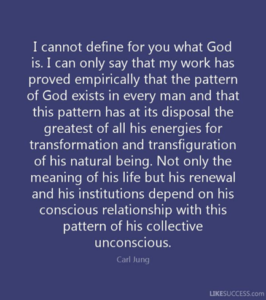 Even if one does not believe in God, there are elements of the idea of God that remain in us… As for me, I don’t see myself as so much dust that has appeared in the world but as a being that was expected, prefigured, called forth. In short, as a being that could, it seems, come only from a creator; and this idea of a creating hand that created me refers me back to God. (Simone de Beauvoir as quoted by Carkner, 2016, p. 73)
Even if one does not believe in God, there are elements of the idea of God that remain in us… As for me, I don’t see myself as so much dust that has appeared in the world but as a being that was expected, prefigured, called forth. In short, as a being that could, it seems, come only from a creator; and this idea of a creating hand that created me refers me back to God. (Simone de Beauvoir as quoted by Carkner, 2016, p. 73)
Our belief in God or religious faith, according to Peterson, is in our genes as evident in the existence of religion in all cultures. Anything that is universally human, by definition, reflects human nature rooted in our genetic make-up. He also hypothesizes that believing in God is inherited as a Jungian collective archetype selected by Darwinian mechanisms because of its adaptive functions over thousands of years. This is his attempt to integrate science and faith as a way to provide a fuller account of humanity.
Peterson also argues that science by itself has its limits; it is not capable of comprehending the metaphorical truth from mythology and religion. Science cannot answer the big life questions of human existence; nor can it show us how to live in a way recognizes the nobility, sacredness, and beauty of life.
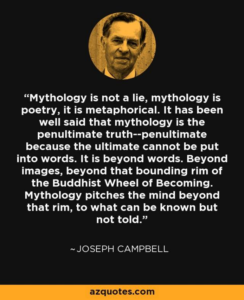 The amazing progress in science and technology has not been matched by a similar moral advance. We need science for our physical and economic wellbeing, just as we need religion for our spiritual and moral wellbeing; that is why we need both science and faith working together in order to save humanity from self-destruction. A full appreciation of life necessarily includes faith in the intrinsic value and sacredness of life. Life is worth living in spite of all the evil and suffering in the world because of its intrinsic meaning and value. Paradoxically, life is truly worth living only when one values something in life to the extent of being willing to suffer and sacrifice oneself for it.
The amazing progress in science and technology has not been matched by a similar moral advance. We need science for our physical and economic wellbeing, just as we need religion for our spiritual and moral wellbeing; that is why we need both science and faith working together in order to save humanity from self-destruction. A full appreciation of life necessarily includes faith in the intrinsic value and sacredness of life. Life is worth living in spite of all the evil and suffering in the world because of its intrinsic meaning and value. Paradoxically, life is truly worth living only when one values something in life to the extent of being willing to suffer and sacrifice oneself for it.
Scientific truth is about the natural material world and mystical truth is about human actions and moral ideals; these two types of truths are very different, but they are equally important for our wellbeing personally and collectively. Basically, human beings do not live in a world of things, but on a stage of actions and dramas, driven by feelings, desires, and imaginations. As Einstein has said: “Science without religion is lame, religion without science is blind.”
A Misguided Life Goal is a Life-Lie
Freedom provides us numerous options in life, but not all goals are of equal value. Without a clear sense of value hierarchy and moral responsibility, we can make terrible choices and mess up our lives. Nihilism promises freedom and happiness but delivers bondage and misery.
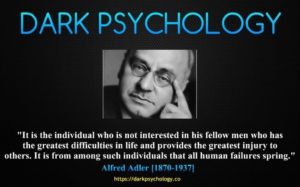 Alfred Adler (1998) has written compellingly on how misguided fictional life goals can result in unhealthy lifestyles and suffering, because such individuals ignore the basic human need for caring for others and devote all their time and energy to striving for power, fame, or whatever makes them feel superior. It is a terrible thing to go through life believing in the delusion that pursuing a fictional life goal can make them happy. When one’s entire life is a lie, one cannot help but tell lies.
Alfred Adler (1998) has written compellingly on how misguided fictional life goals can result in unhealthy lifestyles and suffering, because such individuals ignore the basic human need for caring for others and devote all their time and energy to striving for power, fame, or whatever makes them feel superior. It is a terrible thing to go through life believing in the delusion that pursuing a fictional life goal can make them happy. When one’s entire life is a lie, one cannot help but tell lies.
Similarly, Peterson (2018) also emphasizes that “a naively formulated goal transmutes, with time, into the sinister form of the life-lie” (p. 210). For example, a dream retirement life of “sitting on a tropical beach, drinking margaritas in the sunshine” (p. 210) is a lie, because it will not bring people the imagined happiness; “after three weeks of margarita-filled days, if you have any sense, you’re bored stiff and self-disgusted” (p. 211).
Research has showed that people are poor predictors of future happiness (Gilbert, 2007). The may reason may be that most people do not take time to know their true self or have the courage and responsibility to cultivate mature happiness (Wong & Bowers, 2018).
Peterson again reminds us that people are spiritual beings by quoting this verse: “For what shall it profit a man, if he gains the whole world and forfeits his soul?” (Mark 8:36). Ultimately, fulfillment or happiness comes from a spiritual rather than a material source.
Character Building Demands That We Practice Truthfulness
The main message from Peterson is that character building is the key to simultaneously protect us against suffering and create a better future. An essential ingredient of character is truthfulness. Speaking the truth is also the precondition for everything that is good. The touchstone of one’s character is truth telling.
If you betray yourself, if you say untrue things, if you act out a lie, you weaken your character. If you have a weak character, then adversity will mow you down when it appears, as it will, inevitably. You will hide, but there will be no place left to hide. And then you will find yourself doing terrible things. (Peterson, 2018, p. 212)
Truth will make you free from fears and despair. Personal integrity demands truthfulness. Relationships and community building also demand it. Truth telling may anger or alienate the listener, but the alternative is far worse—the habit of lying will eventually result in self-destruction.
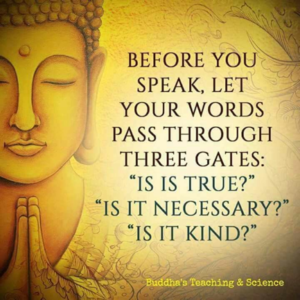 Truth is both necessary and painful. We can make enemies by speaking the truth, but we can help so many people by challenging them to confront reality. Perhaps, love makes truth more acceptable; we need to “speak the truth in love” (Eph. 4:15). A simple practice is that before you say anything, ask yourself three questions: Is it true? Is it necessary? Is it in love? When such practice becomes a habit, truth telling and compassion will become a part of our character.
Truth is both necessary and painful. We can make enemies by speaking the truth, but we can help so many people by challenging them to confront reality. Perhaps, love makes truth more acceptable; we need to “speak the truth in love” (Eph. 4:15). A simple practice is that before you say anything, ask yourself three questions: Is it true? Is it necessary? Is it in love? When such practice becomes a habit, truth telling and compassion will become a part of our character.
Always tell the truth, no matter how difficult. In the long run, honesty is still the best policy. Truth may hurt for a while, but once it is accepted, it will transform you to be a better person and more productive citizen. Painful truths are much better than sweet lies. Truths hurt but transform you and move you forward to a more fulfilling future.
It is therefore prudent to begin with small changes and see if they help. Sometimes, however, the entire hierarchy of values is faulty, and the whole edifice has to be abandoned. The whole game must be changed. That’s a revolution, with all the chaos and terror of a revolution. It’s not something to be engaged in lightly, but it’s sometimes necessary. Error necessitates sacrifice to correct it, and serious error necessitates serious sacrifice. To accept the truth means to sacrifice—and if you have rejected the truth for a long time, then you’ve run up a dangerously large sacrificial debt. (p. 213)
Conclusion
Similar to my conception of second wave positive psychology (PP 2.0; Wong, 2011, 2015), Peterson maintains that our capacity for good cannot be fully developed without recognizing our capacity for evil, and telling the truth is possible only when we are fully aware of our tendency towards lying. It is painful and scary to confront the truth of our proclivity towards lying, but only by accepting this truth can we be motivated to speaking the truth and re-ordering the world according to the Logos. It is through the baptism of fire, everything is renewed; there is no rebirth without death.
The key to understanding Peterson’s thinking is to recognize both the supreme value of human life and the undeniable reality of evil and suffering. The good life is impossible without solving the problem of evil. Evil infiltrates our life in many disguises. Blind wilfulness is evil, because it prevents us from discovering our own shadow. Pride is evil, because it prevents us from knowing the spiritual truth that will make us free.
Even when evil wears an impeccably tailored suit and talks about human rights and democracy with a smile, evil is still evil if it kills and jails innocent people simply because they hold a different political view. To go to bed with such an ideological monster for the sake of enriching oneself is also evil. After all, “Man does not live by bread alone” (Matt. 4:4).
The courage to be vulnerable is the key to speaking the truth without fear of any adverse consequence. When we courageously take on the responsibility and burden to build a better world by speaking the truth and pursuing what is meaningful, we become fully human and realize a little bit of heaven on earth in the midst of chaos and suffering. In the final analysis, truth telling is based on believing in the value and sacredness of life.
Telling the truth is a gamble on the benevolence of being. So the idea is you tell the truth, you don’t manipulate the world to make it give you what you want, you try to articulate yourself—and articulate the manner of your being, as clearly and as comprehensively as possible—and then you see what happens. And you decide—this is the act of faith—you decide that no matter what happens, if you tell the truth, that that’s the best possible outcome. (As cited by Lovins, 2018)
MEETUP 2018
Decoding Peterson’s
12 Rules for Life
This is the second of four Meetups on “Decoding Jordan Peterson’s 12 Rules of Life,” hosted by Dr. Paul Wong for the INPM’s Meaningful Living Project. For an overview of this Meetup series, see below.
References
- Adler, A. (1998). Social Interest: Adler’s key to the meaning of life. London, UK: Oneworld.
- Beran, T. (2015). Research advances in conformity to peer pressure: a negative side effect of medical education. Health Professions Education, 1(1), 19-23. https://doi.org/10.1016/j.hpe.2015.11.004
- Burton, N. (2012). Hide and seek: The psychology of self-deception. London, UK: Acheron Press.
- Carkner, G. E. (2016). The great escape from nihilism: Rediscovering our passion in late modernity. Abbotsford, BC: Infocus.
- Carmichael, A. M., & Krueger, L. E. (2015, July 8). Research highlights how easily and readily students fabricate excuses. Faculty Focus. Retrieved from https://www.facultyfocus.com/articles/teaching-and-learning/research-highlights-how-easily-readily-students-fabricate-excuses-2/
- Đurić-Jočić, D., Pavlicić, N., & Gazivoda, V. (2016). Pathological lying and tasks of psychological assessment. Vojnosanitetski Pregled/Military Medical Journal, 75(2), 219-223. https://doi.org/10.2298/VSP151213243D
- Gilbert, D. (2006). Stumbling on happiness. New York, NY: Vintage Books.
- Goleman, D. (1985). Vital lies, simple truths: The psychology of self-deception. New York, NY: Simon & Schuster.
- Hesselmann, F., Graf, V., Schmidt, M., & Reinhart, M. (2017). The visibility of scientific misconduct: A review of the literature on retracted journal articles. Current Sociology, 65(6), 814-845. https://doi.org/10.1177/0011392116663807
- Lovins, T. (2018, March 25). Why tell the truth: On the curious notions of Jordan B. Peterson. Reason Revolution. Retrieved from https://reasonrevolution.org/introduction-to-jordan-peterson/#_ftn45
- Matthews, M. A., & Mazzocco, P. J. (2017). Perceptions of religious hypocrisy: When moral claims exceed moral action. Review of Religious Research, 59(4), 519-528. https://doi.org/10.1007/s13644-017-0307-4
- Medin, D., Lee, C. D., & Bang, M. (2014, October 1). Point of view affects how science is done: Gender and culture influence research on a fundamental level. Scientific American. Retrieved from https://www.scientificamerican.com/article/point-of-view-affects-how-science-is-done/
- Miller, D. T., & Ross, M. (1975). Self-serving biases in the attribution of causality: Fact or fiction? Psychological Bulletin, 82(2), 213-225. https://doi.org/10.1037/h0076486
- Phillips, G. A. (1971). Ludwig Wittgenstein: A philosophical theory of language acquisition and use. Word, 27(1-3), 139-157. https://doi.org/10.1080/00437956.1971.11435619
- Pychyl, T. A. (2012, August 17). The power of hypocrisy: Practice what you preach. Psychology Today. Retrieved from https://www.psychologytoday.com/ca/blog/dont-delay/201208/the-power-hypocrisy
- Psychologist World. (n.d.). Ingratiation as a persuasive strategy. Psychologist World. Retrieved from https://www.psychologistworld.com/behavior/compliance/strategies/ingratiation-persuasion
- Rosling, H. (2018). Factfulness: Ten reasons we’re wrong about the world—and why things are better than you think. New York, NY: Flatiron Books.
- Ross, L. (1977). The intuitive psychologist and his shortcomings: Distortions in the attribution process. In L. Berkowitz (Ed.), Advances in experimental social psychology (Vol. 10, pp. 173-220). Cambridge, MA: Academic Press.
- Sirota, M. (2018). The dark side of being too nice. Dr. Marcia Sirota, M.D. Retrieved from http://marciasirotamd.com/psychology-popular-culture/dark-side-people-pleasing
- Slayback, Z. (2018, January 26). Why do intellectuals oppose Dr. Jordan B. Peterson? Peterson popularizes ideas from the academy… and is successful doing so. Age of Awareness. Retrieved from https://medium.com/age-of-awareness/why-do-intellectuals-oppose-dr-jordan-b-peterson-f8b4e6dbe04c
- Taylor, S. E., & Brown, J. D. (1994). Positive illusions and well-being revisited: Separating fact from fiction. Psychological Bulletin, 116(1), 21-27. Retrieved from http://www.psych.utoronto.ca/users/peterson/psy430s2001/Taylor%20SE%20Positive%20illusions%20and%20well-being%20Psych%20Bull%201994.pdf
- Watson, R. (2018, July 21). Why the Stanford Prison Experiment is a lie. Skepchick. Retrieved from http://skepchick.org/2018/06/stanford-prison-experiment-lie/
- Wong, P. T. P. (2011). Positive psychology 2.0: Towards a balanced interactive model of the good life. Canadian Psychology, 52(2), 69-81. https://doi.org/10.1037/a0022511
- Wong, P. T. P. (2015). What is second wave positive psychology and why is it necessary? Dr. Paul T. P. Wong. Retrieved from http://www.drpaulwong.com/what-is-second-wave-positive-psychology-and-why-is-it-necessary/
- Wong, P. T. P. & Bowers, V. (2018). Mature happiness and global wellbeing in difficult times. In N. R. Silton (Ed.), Scientific concepts behind happiness, kindness, and empathy in contemporary society (pp. 112-134). Hershey, PA: IGI Global.
Cite
Wong, P. T. P. (2018, June 17). Words have serious consequences; therefore, be responsible for what you say (Lesson 4). INPM. Retrieved from http://www.drpaulwong.com/words-have-serious-consequences-therefore-be-responsible-for-what-you-say
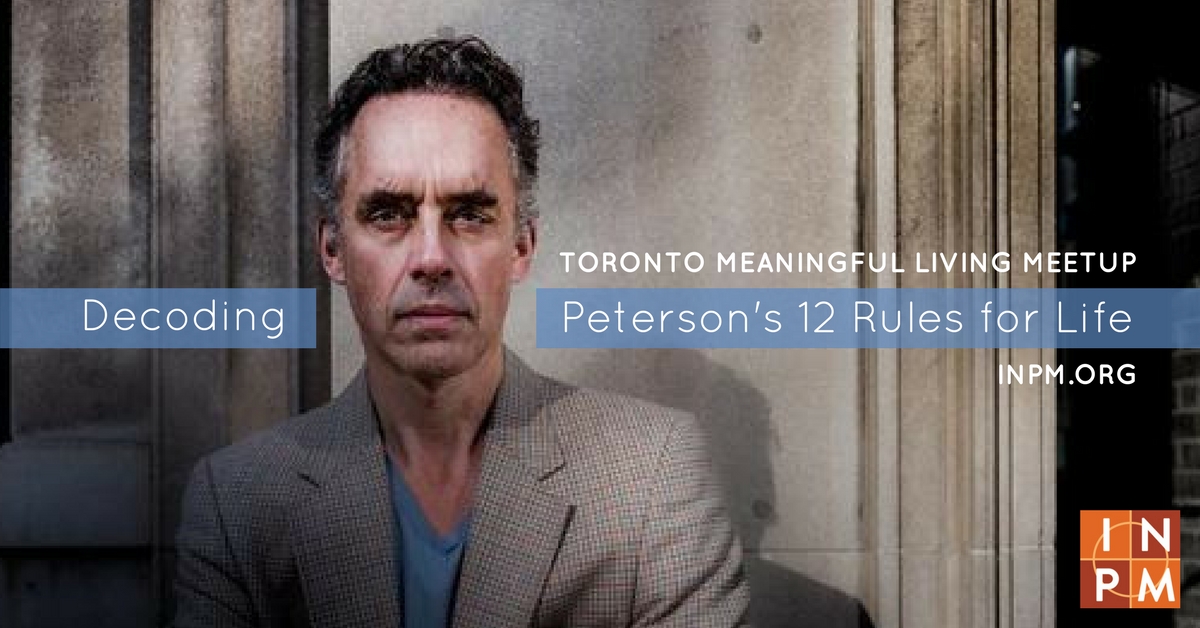
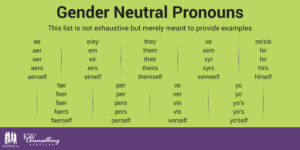
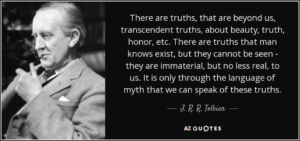

 Meaning Conference 2025 will be the INPM’s first in-person conference with a virtual option after the pandemic.
Meaning Conference 2025 will be the INPM’s first in-person conference with a virtual option after the pandemic.